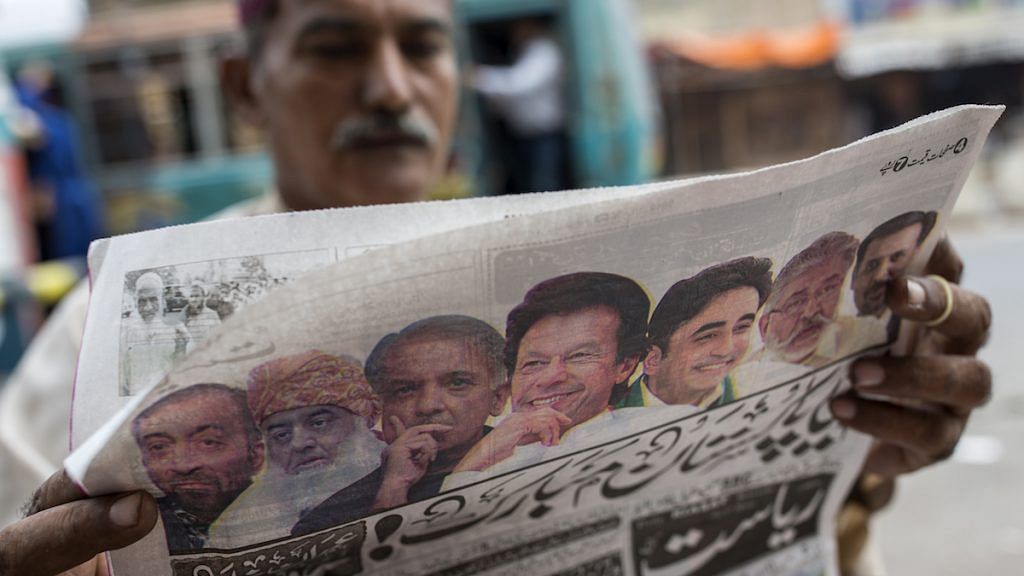A lot has been said about the Indian media’s irresponsible coverage during the recent Pakistan-India conflict, but the Pakistani media’s role has been no better and was perhaps even worse, given its blatant censorship of crucial facts.
The popular narrative/portrayal that has gained ground is that Pakistan’s media appears to have taken a higher moral ground by saying it stood for peace while Indian media called for war in the aftermath of the terror attack in Pulwama.
However, the reality is a little more nuanced. It may be true that it advocated for peace, but that is the position the Pakistani military has pushed for, and has been doing for almost two decades now since both neighbours went nuclear: Fuel the conflict through non-state actors, deny Pakistan has anything to do with it, and then hide behind empty peace overtures.
Also read: Brexit to Balakot, what is fuelling the anger in you and who is responsible
Half-truths on Balakot
What’s more, many Pakistani journalists have been criticising the Indian media, with almost a self-righteous attitude. A news channel head in a television show recently said he was disgusted by the behaviour of Indian media, even though the network he runs has been involved in reporting half-truths about the Balakot air strikes.
How can the Pakistani media industry be sincere and committed to peace when it has been lying to itself and the public about some obvious facts surrounding the issue of militancy, particularly about this latest Balakot strikes, for which it has been mostly regurgitating what the Pakistani state is telling it to do.
One of the main facts that the local media has blacked out is the presence of Jaish-e-Mohammed’s (JeM) seminary in the area where the Indian bombs fell. Leading journalists like Hamid Mir and many more who went to the location of the bombing and did shows from the ground have not once mentioned the presence of the JeM seminary in their coverage, even though they recorded the show some meters away from it.
Also read: News channels in India revived their romance with ‘sources’ this week for all things Balakot
Using international media reports
Mainstream newspapers in Pakistan like Dawn have published stories aggregating content from international newspapers like the New York Times, Reuters, Guardian to call out Indian claims, but these reports completely ignored the fact that international media has also linked the seminary to a terrorist group.
Another thing that is conspicuous by its absence in the on-ground reporting by Pakistani media is the now-missing signboard of this seminary, which mentioned it was being run by Masood Azhar, the chief of JeM. The international media even reported how it was taken away last Thursday, after its photos went viral on social media.
It has also been reported by foreign outlets that access to this seminary is being repeatedly blocked by Pakistan army soldiers. Reuters reported Friday that they made three attempts to go near the seminary in the last nine days, but every time they tried, they were told by soldiers on sight that no one was allowed to visit the seminary due to “security concerns”. Again, there are no mentions of this in the local Pakistani media reports and commentaries.
Also ample evidence has come up online that this particular seminary was holding events where the JeM leadership recruited youngsters for jihad, as reported by the Al Jazeera, which shared evidence of an event happening in April 2018, just ten months before the Indian action of 26 February 2019, but the Pakistani media has not pursued this story angle either.
Muted coverage
There has been a complete blackout of the February event in Peshawar city, reported by this paper, where the Jaish leadership (some of whom are under custody now) met and acknowledged that the Indian strike’s target was indeed their centre.
When the Pakistani government recently announced action against some of these Pakistan-based terror groups, including the JeM, even then the coverage was superficial. There were hardly any questions about why and how these groups have continued to expand in Pakistan when they were banned years ago.
How can this be called responsible journalism? By denying the reality on ground – about groups that have also caused havoc on Pakistani soil and continue to do so – how can the Pakistani media hope for peace?
Also read: Indian TV news feels the ‘josh’ of airstrikes, Pak media takes forest cover
History of silencing the media
Is the Pakistani media censoring voluntarily? Not really. Scores of Pakistani journalists have been beaten, arrested and killed in the country in recent years, for their critical reporting about the Pakistan Army. Just in the last one year, thousands of journalists have been fired from multiple local news organisations, some of which have even shut down in recent months due to an artificial financial crunch that media industry experts accuse the government of orchestrating. The government has even used treason, cyber-crime and counter-terrorism charges to silence the media.
Unlike the Indian media, where the problem seems to be of lack of professionalism, which can be self-corrected, the ability of Pakistani media to fight back doesn’t come easily, given the risks with challenging state-sanctioned censorship.
But if the Pakistani media supports peace in the region as it keeps professing to, it needs report openly about the presence of terror groups on its soil and ask the government some tough questions about the lack of action against them till now.
After its war cry, the Indian media seems to be doing some soul-searching as is evident in a few recent hard-hitting articles questioning the role of the government ‘sources’ in its coverage. It’s about time the Pakistani media does the same.
The author is an award-winning Pakistani journalist living in exile in France. He teaches journalism and is writing a book on Pakistan. He also manages safenewsrooms.org, a digital media platform documenting press censorship in South Asia. He tweets @TahaSSiddiqui.
